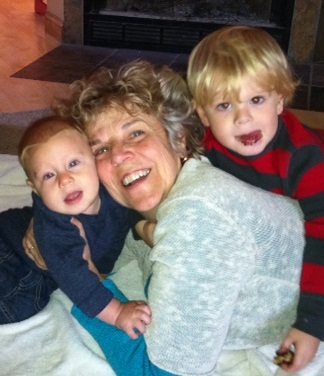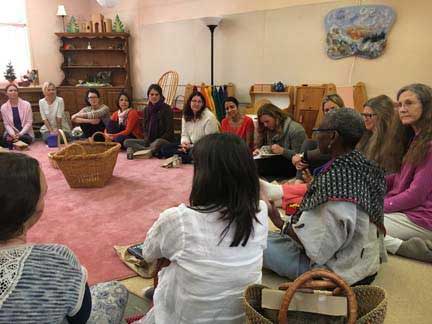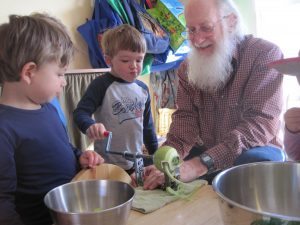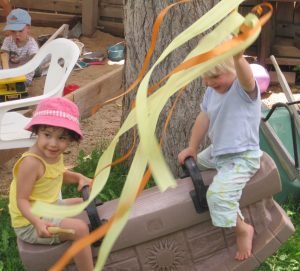Who We Are
Our History
LifeWays North America was founded in 1998 by Cynthia Aldinger and friends and draws upon her many years of experience as a Waldorf kindergarten teacher, mother and grandmother. Although Rudolf Steiner, the founder of Waldorf education, did not suggest a specific curriculum for early childhood, he gave numerous lectures on child development that included deep insight regarding the child from birth to seven.
While attending an international Waldorf kindergarten conference in 1995, Cynthia was approached by an entrepreneurial friend with his concern that the current approach to childcare was not really preparing children for practical, daily life or supporting them in developmentally appropriate ways. During that conference, Cynthia encountered the inspiring work of Helle Heckman, a Danish Waldorf early childhood pioneer who was developing innovative new approaches to childcare.
Inspired by these encounters, Cynthia began to develop a vision for Steiner-inspired childcare that would be based on the activities and natural rhythms of healthy home life, bathed in the warmth of secure relationships and family-style mixed ages, and made to feel as non-institutional as possible. This first written vision evolved over time into the current Principles and Practices of LifeWays® Childcare.
Cynthia was also deeply moved by the work of Bernadette Raichle in New Zealand, whose early childhood center, Awhina, filled her with wonder and delight. In addition to bringing new inspiration and ideas to the LifeWays work, observing at Awhina affirmed how homelike, simple living serves all the fundamental needs of young children and their caregivers. It was intriguing to consider having children for longer than the morning kindergarten, allowing an expanded flow of the day with more time outside, a family-style meal in the middle of the day, a good sleep after lunch, and the practical, nurturing and creative activities of family-life throughout. It was equally exciting to see infant and toddler care as part of the mixed-age approach.
With support from her friend and colleague, Rena Osmer, and the blessing of their colleagues Gudrun Davy, Bons Voors, Patti Smith, Signe Schaefer, and Lee Sturgeon-Day, and with the organizing support of Lori Barian and other Wisconsin friends, the first LifeWays Center was opened in Wisconsin in September 1998. It was the pilot childcare project for children three months to six years old and also hosted the first LifeWays® training.
Our national organization, LifeWays North America, formed a few years later as a multiservice organization providing consulting and training for family childcare providers, childcare centers, parent-child teachers, home-based preschool teachers, after-school care providers, and parents. Our progressive approach to caregiving, teaching and homemaking is supported by a growing body of research acknowledging simplicity and practical, nurturing activities as fundamental to the health and well-being of children. There are now LifeWays® early childhood programs throughout North America. LifeWays® trainings and workshops are also available now in several locations, as well as a growing selection of online courses.


LifeWays Principles
- Young children thrive in the presence of parents and other devoted caregivers who enjoy life and caring for children. They learn primarily through imitation/empathy and, therefore, need to be cared for by people with integrity and warmth who are worthy of being imitated. This is the foundation for learning and healthy development.
- Having consistent caregivers, especially from birth to three years old and, preferably, up to primary school age, is essential for establishing a sense of trust and well-being.
- Children need relationship with people of all ages. Infants and toddlers thrive in family-style blended-age care, while older children see nurturing modeled by the adults and experience their own place in the continuum of growing up. Children of all ages can both give and receive special blessing when in the company of elders and youth who enjoy children.

- Each person is uniquely valuable, gifted with purpose and worthy of respect throughout all phases of his or her life’s journey.
- Human relationship and activity are the essential tools for teaching the young child all foundational skills for life. Infants and toddlers develop most healthily when allowed to have freedom of movement in a safe environment. For three- to six-year-olds, creative play, not technology or early academics, forms the best foundation for school work and for life-long learning.
- In infancy and early childhood, daily life experience is the “curriculum.” The child’s relationships to the caregivers and to the environment are the two most important aspects through which the child can experience healthy life rhythms/routines. These include the “nurturing arts” of rest and play, regular meal times, exploring nature, practical/domestic activities, social creativity, music and simple artistic activities.
- Young children thrive in a home or home-like environment that offers beauty, comfort and security, and connection to the living world of nature. Healthy sense development is fostered when most of their clothing and playthings are of non-synthetic materials and their toys allow for open-ended, imaginative play.
- Childhood is a valid and authentic time unto itself and not just a preparation for schooling. Skipping or hurrying developmental phases can undermine a child’s healthy and balanced development.
- Parents of young children need and deserve support in their path of parenting—from professionals, family, and one another. They thrive in a setting where they are loved, respected and helped to feel love and understanding for their children.
- Caregivers also have an intrinsic purpose and need to be recognized and appropriately compensated for the value of their work. They need an environment where they can create an atmosphere of “home,” build true relationship to the children, and feel autonomous and appreciated.
Suggested Reading
Please visit our LifeWays Store to purchase our books, Home Away from Home and Life is the Curriculum. These are the most comprehensive sources of information and inspiration about the LifeWays approach to childcare.
The following are a few of the titles we have found inspiring:
- Home Away from Home: LifeWays Care of Children and Families – Aldinger and O’Connell
- Life is the Curriculum – Aldinger
- You Are Your Child’s First Teacher – Baldwin Dancy
- Beyond the Rainbow Bridge: Nurturing our children from birth to seven – Patterson & Bradley
- Words for Parents in Small Doses – Frizlen
- Nokken – Heckman
- Lifeways – Davy and Voors
- The Incarnating Child – Salter
- Singing with Children Series – Thienes-Schunemann
- Caring For Infants With Respect – Gerber
- Creating a Home for Body, Soul and Spirit – Raichle
- Cooking for the Love of the World – Marie Fryer Wilbott
Many of these titles can be ordered from the following:
Waldorf Books, www.waldorfbooks.com
Steiner Books, www.steinerbooks.org
Rudolf Steiner College Bookstore, www.rscbookstore.com
Naturally You Can Sing, www.naturallyyoucansing.com
Waldorf Early Childhood Association (WECAN), https://store.waldorfearlychildhood.org/collections
LifeWays Suggested Practices
General
- LifeWays practices are based upon the fundamental need for relationship-based care (bonding and continuity), neurological and anthroposophical research, and recognition of living arts (domestic, nurturing, creative and social arts) as central to the advancement of children’s social, emotional and intellectual skills. These practices can be applied in parenting, in childcare homes and centers, and early childhood programs in schools.
- In child care, “suites” consist of small groups of children who stay together with the same caregivers over a several-year period whenever possible, creating a more homelike atmosphere and better teacher-child ratios.
 Emphasis is placed on play, with practical life skills such as building, gardening, cleaning, cooking, washing, repairing, sewing, care of the environment and creating simple beauty among other things.
Emphasis is placed on play, with practical life skills such as building, gardening, cleaning, cooking, washing, repairing, sewing, care of the environment and creating simple beauty among other things.- Movement/play curriculum emphasizes child-initiated activities that promote healthy musculoskeletal development, providing opportunities for unstructured, spontaneous movement in a safe environment. Traditional games and finger-plays provide opportunities for the children to imitate healthy movement, develop. proprioception and vestibular capacities, and increase both their small and large motor skills.
- The children go outside in all but the most inclement weather. This helps them become more robust and strengthens their bond with the environment in which they live. A protected area is provided for crawlers and infants. Where it is possible, infants who fall asleep outside can remain outside, snuggly wrapped and covered in a buggy, until time to go in. Fresh air provides a deep, more restful sleep.
- Emphasis is on loving human interaction with warm speech, live singing, verses, and stories rather than technology. LifeWays early childhood settings are screen-free environments except for use in administration and adult education.
- Child guidance is based on the L.O.V.E. Approach to Discipline which includes Listening, Laughter, Order, Objectivity, Versatility, Vulnerability, Energy and Enthusiasm.
- Foundation for lifelong literacy is fostered through storytelling and puppetry, individual lap time with a book, through poetry, verse, and music on a daily basis, through drama, and through the daily interactions of play and movement in a healthy, secure environment.
- Pre-School/Kindergarten program is a developmentally appropriate, play-based approach found in Waldorf preschools and kindergartens throughout the world.
- We provide the best in natural organic foods (whenever this is possible) and involve the children in the food preparation.
- Festivals and celebrations, honoring the various cultural backgrounds of the families, as well as traditional seasonal festivals and birthday parties, are offered.
- When possible, ongoing relationships are established with senior adults and youth who visit on a regular basis.
- Foreign language –Community friends who speak a native language other than English may be invited to play simple games or sing simple songs with the children on a routine basis.
Specific to the Infants (in addition to the applicable points above)
- Infants are provided safe environments in which to explore and move freely – no walkers, bouncers, infant gyms, or other mechanical devices are necessary.
- The infants are carefully wrapped for sleeping to provide a healthy sense of security and warmth, and caps are provided to protect their sensitive heads and ears.
- Rocking and cuddling are encouraged to develop a healthy sense of touch and movement and to promote security, bonding and comfort.
- Physical care (diapering, clothing, feeding) provide focused time for connecting with the caregiver and may include a special name song for the baby or a simple nursery rhyme, and a gentle massage. Infants will be encouraged to participate in clothing themselves; for example, by learning to lift their own bottoms for diapering or pulling on their own socks when capable.
- Mothers are welcomed to come and nurse their babies when possible.
- Clear, articulate, melodic speech is expected of the caregivers when speaking to the infants throughout the day.

 Emphasis is placed on play, with practical life skills such as building, gardening, cleaning, cooking, washing, repairing, sewing, care of the environment and creating simple beauty among other things.
Emphasis is placed on play, with practical life skills such as building, gardening, cleaning, cooking, washing, repairing, sewing, care of the environment and creating simple beauty among other things.